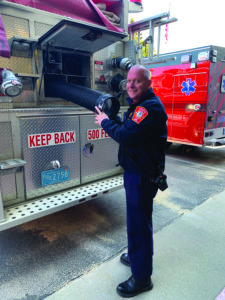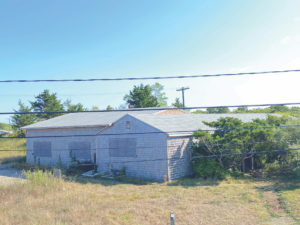TRURO — The annual town meeting will kick off at 10 a.m. on Saturday, April 30 at the Truro Central School ballfield, where voters will be asked to approve a grand total of 54 articles. This year, the fire department’s staffing crisis hit fever pitch, and the town is asking for a Proposition 2½ override to hire four more firefighter-paramedics.
Another issue will be the planning board’s proposed zoning bylaw changes, which were strongly opposed by the select board. And voters will consider expanding the town’s child-care voucher program to all children through the age of four.
Hiring Firefighter-Paramedics
Town meeting voters will be asked to expand Truro’s fire department by approving a Proposition 2½ override to fund four full-time firefighter-paramedics and to help the department pay for equipment and capital expenditures. The exact breakdown of how these override funds will be used depends on whether Truro receives a Staffing for Adequate Fire and Emergency Response (SAFER) grant by Oct. 1.
Truro’s department is running on “bare bones,” Town Manager Darrin Tangeman told the Independent last fall. At that time, the town was facing a cluster of resignations that left the department with only three full-time firefighters. The select board responded by raising salaries, which made Truro more competitive with neighboring towns, and the department was able to make some hires.
Since then, Truro has been scraping by, staffing the station with two firefighters 24 hours per day — in other words, just barely meeting state-required minimum staffing levels to operate an ambulance. This leaves the department with “no margin of error,” Chief Tim Collins told the select board on Jan. 25. “Anytime there’s a position that is vacant, it must be filled with overtime. So, any absence creates a burden on the existing staff and can lead to mandated overtime.”
These demands ramp up firefighter fatigue, decrease effectiveness, and strain the department’s ability to train new firefighters, Collins said. He urged the board to think beyond two-person crews and work towards establishing three-person crews, which, according to a study, can complete 22 fireground tasks, on average, 25 percent faster.
If the override is approved, the four additional personnel will allow the department to run three-person shifts — and also help the staff “meet community demand if contracted EMS service providers are no longer able to operate,” states the warrant explanation.
Truro’s contracted EMS service provider — the Lower Cape Ambulance Association (LCAA) — has an uncertain future. Provincetown and Truro each have contracts with the nonprofit, but in recent years Provincetown has been moving toward ending its contract. Without cost sharing, Truro would be unable to shoulder the full-time cost, and would have to follow suit. On Apr. 12, the select board heard the findings of a regional EMS study by Capital Strategic Solutions, which recommended the towns eventually phase out LCAA altogether and establish their own services. (See story on front page.)
The override would permanently raise the town’s levy limit by $355,765. For the average assessed-value home in Truro (currently $699,961), this article would increase residential property taxes by $100.72 per year.
If the town does not receive the SAFER grant, $327,965 of the override would go towards the four firefighter-paramedics’ salaries, wages, and health insurance plans, with the remainder for supplies and services. If the town does secure the grant, SAFER would fund the four positions for three years, and the extra money could be used to buy an ambulance.
The Zoning Bylaw
The select board and the planning board have been at loggerheads when it comes to the planning board’s proposed zoning bylaw changes. None of the planning board’s four articles received an affirmative vote from any of the select board members.
Article 43 amends the “purpose” of the zoning bylaw, adding four more goals including “protecting native soils” and “maintaining the scenic rural character, ambiance, and aesthetics of Truro.”
Article 44 tweaks the definition of “street.” Article 45 expands the town’s rules on lot coverage, and Article 46 eases some rules around converting homes to duplexes.
The Independent reported on the back-and-forth over these articles on March 17 and March 31. Anne Greenbaum, chair of the planning board, admitted to the select board on March 8 that she and her colleagues had drafted these bylaws in a “silo.” The planning board did not consult the town staff members who would enforce these bylaw changes, such as the health agent, building inspector, and dept. of public works personnel.
The select board deemed the articles not ready for town meeting. Chair Bob Weinstein called them examples of “regulatory overreach.”
The planning board attempted to revise the articles on March 9, but their revisions were rejected by the select board. The original versions appear on the warrant as Articles 43 to 46.
Meanwhile, the planning board itself is on the town warrant as Article 50. Truro resident Raphael Richter reintroduced his citizen-petitioned article calling for the planning board’s members to be appointed by the select board rather than elected by town voters. The Independent published a detailed look at Article 50 on April 14.
Child-Care Vouchers
At last year’s town meeting voters approved a different petitioned article from Richter, which created a voucher program for child care. The $7,500 vouchers are available for parents who enroll their two-year-old children in state-licensed child-care programs. This year, town meeting voters will be asked to make this program available to all children through age four.
Article 51 originated from two separate proposals, one to expand the voucher program to children younger than two and another to provide vouchers to any three- and four-year-olds who could not be accommodated at Truro Central School’s all-day preschool.
At their March 22 meeting, select board members Stephanie Rein and Kristen Reed suggested that Richter merge the two measures into one.
If approved, the voucher system will be funded by $300,000 from the town’s free cash account. Each child will receive a maximum of $7,500, as was the case last year.




